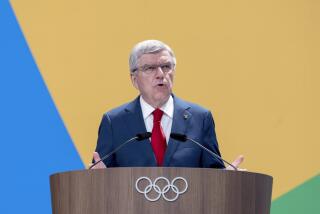N.Y. Delay of Olympic Proportions
- Share via
NEW YORK — New York state officials delayed a vote this week on plans to build a football stadium in Manhattan, raising new doubts about the $2-billion project and dealing a potentially fatal blow to New York’s bid for the 2012 Summer Olympics.
The stadium, the linchpin of the city’s bid for the games, has been championed by New York Mayor Michael R. Bloomberg and Gov. George E. Pataki. But two state lawmakers blocked a vote on the project Tuesday night, voicing concerns over its cost and recently filed lawsuits.
Under state law, the project needs unanimous approval from the Public Authorities Control Board, a three-person agency. Pataki sits on the board, along with Republican Senate Majority Leader Joseph L. Bruno and Democratic Assembly Speaker Sheldon Silver.
“We’ve been asking for answers, and what we get is: ‘Do it, do it,’ ” Bruno said, criticizing stadium backers who had been pushing for a quick board vote. “We’re better off trying to talk it through so this doesn’t become a circus.”
Silver said he was reluctant to vote because the estimated $600-million public cost could grow and that more time was needed to explore the issue.
Pataki, however, expressed hope that the stadium would be voted on at the board’s next scheduled meeting, June 22, or earlier in a special session. He and others have cautioned that time may be running out on the city’s push for the Olympics.
“I don’t think we can just wait another month,” the Republican governor told reporters shortly before he agreed to delay the vote.
Bloomberg declined comment on the state board’s delay.
The International Olympics Committee is scheduled to announce its decision July 6 on who will host the 2012 Summer Games. New York’s bid would not be viable without firm guarantees that a stadium would be built, backers said.
The proposed project, on the West Side of Manhattan near the Hudson River, also would expand the capacity of the city’s nearby convention center. The stadium would be built mainly for the New York Jets, who play their home games in New Jersey.
Under the financing plan, the city and state each would contribute $300 million, and the Jets would pick up the rest of the construction cost. It would be the most expensive football stadium in the country.
Backers of the plan this week held a rally of union members and other stadium supporters on the Capitol steps in Albany. Pataki made a brief appearance and told cheering supporters: “I want to see the [stadium plan] approved, and I think it is the right thing to do, not just for the city but for the state.... Don’t you think we should be saying yes to having the Jets back in New York?”
Critics, however, have said the proposal mainly will benefit the Jets, and that the city and state can ill afford to commit $600 million when school, law enforcement and other programs face cuts.
The most intense opposition has come from Cablevision Inc., which owns Madison Square Garden. The media giant has bought more than $7 million in television ads criticizing Bloomberg and the project. Cablevision also has filed a lawsuit challenging the state’s decision to grant the Jets development rights to the property.
Bruno cited that lawsuit as a key reason for his refusal to vote this week on the project. He has said the legal issue could be resolved within weeks, at which time a vote would be appropriate.
The issue has divided New Yorkers and is spilling into this year’s mayor’s race. A majority of voters have told pollsters they oppose a stadium in Manhattan, and all four of Bloomberg’s Democratic opponents have lined up to attack the proposal.
Editorial boards of the city’s major newspapers also are split on the issue.
“These guys [Bruno and Silver] are playing with fire, because a stadium delayed may well prove to a stadium denied,” said the New York Post, which supports the plan. But the New York Times, which opposes the project, said the state board should delay its final vote until the Olympics decision in July, saying: “Any vote before then would be for a football stadium that New York cannot afford, and does not need.”
More to Read
Go beyond the scoreboard
Get the latest on L.A.'s teams in the daily Sports Report newsletter.
You may occasionally receive promotional content from the Los Angeles Times.






